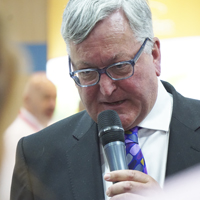‘Momentous’ fish health plan will grow industry

THE Scottish government is to work in tandem with the country’s fish farmers to address health challenges and help the industry grow sustainably, rural affairs minister Fergus Ewing announced this morning.
As he opened the Aquaculture UK exhibition in Aviemore, he unveiled a ‘momentous’ ten-year Farmed Fish Health Framework, that aims to not only enable growth but also minimise impacts on the environment.
The framework has six work streams which will deal with fish health issues and review sea lice protocols. A separate work stream will be set up to cover wild and farmed fish interactions, and will include representatives from both sectors.
Ewing (pictured) repeated his support for aquaculture, saying it supported 12,000 jobs, many of them well paid, and workers in the sector were the backbone of their Highlands communities.
He said it was very important that this message is delivered ‘loud and clear’, and he couldn’t think of an industry that had been on the receiving end of so much criticism and been given so little credit for its successes.
In front of the already large crowds attending the two-day show, he held up the pocket size guide to salmon farming, ‘Reported versus Reality’, published recently by the industry, and told delegates to hand it out, ‘to counteract the unfounded smears and attacks we see repeated all too frequently in our mainly metropolitan press’.
The nation’s salmon farmers have come under persistent attack from environmental groups, some Green politicians and the angling lobby, and the industry is currently the subject of a parliamentary inquiry.
Ewing was the final witness before the Rural Economy and Connectivity (REC) committee which is now considering its recommendations. He told MSPs at the session, on May 9, that the publication of the health framework, which will tackle high levels of mortality, was imminent.
The health framework was produced by the Farmed Fish Health Working Group, established in December 2017 and co-chaired by Marine Harvest Scotland managing director Ben Hadfield and head of science at Marine Scotland Colin Moffat.
Transparency and open communication’ will be key principles in the framework, which states that maintaining high levels of fish health requires further strategic planning and coordinated action, and it will provide the focus and mechanism to do this.
It will also ensure that the ‘right people, organisations and resources come together’ to respond to health challenges.
And the working group will present an annual update to the Scottish government and parliament of the progress it is making.
The main objectives are to improve fish health, share information about mortality, disease and parasite levels, support innovation in fish health management, and identify areas where the regulatory framework could be improved.
There will be six specific work streams to deliver these objectives: information flow and transparency; gill health; sea lice; cleaner fish; production cycle and on-farm management; licensing regime and medicine use; and climate change and ocean acidification.
The working group, which includes fish farming businesses, trade groups, the Scottish Aquaculture Innovation Centre, vets, and regulators, acknowledges a deterioration in farmed fish survival in Scotland in the years up to and including 2017.
‘The industry understands that it makes business sense to produce healthy fish and that doing so depends on the marine and coastal environment,’ the framework says.
‘Producers recognise that sustainable growth can only come as a consequence of continuous improvement in biological performance. They also understand their responsibilities to uphold the highest standards of welfare in how they care for their fish.’
For the first time, farmers will collate annual mortality rates by cause for the whole sector, developing a ‘national approach to data sharing’ to promote openness and transparency.
This approach will include site by site reporting of key statistics such as sea lice and mortality, and an action plan to reduce mortality.
Marine mortality
On gill health, described by the working group as the ‘most significant contributor to increasing marine mortality’, the framework’s aim is to better understand the environmental factors that contribute to gill disease, support research, establish best surveillance practice, and convene workshops on, for example, net cleaning.
Tackling sea lice, the framework notes that strategies have evolved and are now less based on medicines and are more balanced. But this has created new problems, with treatment such as physical removal of lice increasing the need for fish to be handled, a contributory factor in mortality.
The aim of the framework is to continue improving the control of sea lice on farms and potentially reduce interactions with wild fish.
It will review Scotland’s voluntary sea lice compliance policy, including reporting requirements and intervention thresholds, and make recommendations to ensure it remains fit for purpose.
It will launch a study to look at the health and environmental benefits of consolidation of existing farm sites, and create a ‘sea lice modelling and farm connectivity action plan’ to identify optimal sites.
The other work streams will focus on meeting industry demand for cleaner fish and setting up an international forum for sharing cleaner fish husbandry.
Continuing the practice of putting larger smolts to sea shortens farming cycles and allows more frequent fallowing, which allows for a break in sea lice and other pathogen life cycles.
On the licensing regime and medicine use, the work stream will explore new treatment technologies, including alternatives to well boat treatment, looking at well boat discharge.
And it will encourage the development of new medicines, ‘with the aim of increasing treatment flexibility and allowing the potential to explore treatment rotation…within environmentally sustainable limits.’
Fergus Ewing said some of the above actions are already underway and others require further development, ‘but all are important to endure the sustainable growth of aquaculture in Scotland’.
The public don’t know about the massive investment the industry makes in meeting these challenges, he said, and it was time they did.
‘The framework must now translate into action and deliver tangible progress.’

